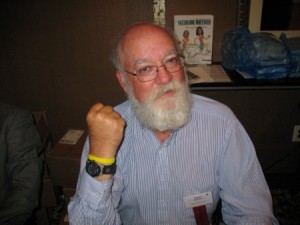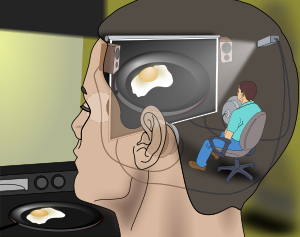I was lucky enough to get a chance to listen to Daniel Dennett, one of those philosophers who have their own Wiki page. He is interested in cognitive science, free will, very much pro-evolution and atheism. According to this wiki page he is also a Compatibilist, which as I learned just now is a label for someone who believes that free will and determinism are compatible. And a big part of his talk was dedicated to this topic.
Way back when, he already wrote a book with an ambitious title Consciousness_Explained (I am still reading it). Besides being simply ambitious, such title sweeps every decent neuroscientist off of his feet. An indirect provocation.
The title of the talk saying “When Neuroscientists think they can do Philosophy” was enough of a direct provocation to fill the large lecture room of 400+ sits even when the tickets were not free. And there were people who didn’t get in. And there was someone leaving the talk after 15 minutes loudly saying something along the lines – “Bullshit, I have better things to do in my life.” All the signs of a good talk about to happen.
Determinism and free will
As I promised the main topic Dennett discussed was the human ability to exercise free will (the actual definition of free will being avoided at this point) even with the deterministic natural hardware which underlies everything (free will without supernatural). And he is very serious about the natural hardware underlying everything. His views are described by sort of his own quote: “Yes, we have a soul, but it’s made of lots of tiny robots.”
Why is this problematic? Simply, in a deterministic world, there are no real opportunities to change the future. Here Dennett shows how silly the notion of changing the future is with a single question. Changing the future from what to what? How can you change something, which does not yet exists? Lovely.
Now within the talk, Dennett put forward several thought experiments, one of which with 2 computer chess-playing programmes, or as he puts it – check-mate-avoiding programmes and how they in sense are agents who exercise a toy version of free will (within a deterministic programme).
All this was too much to report on (plus my notes do not allow me a proper recollection of the experiments). I’ll only add his claim that other species of animals (other then human) have not evolved sufficient software to be able to exercise free will. They are simply too simple.
Free will is an illusion
Just to make things clear, Dennett is not saying the free will is an illusion, but rather the opposite, trying to refute it. This is the first point, where he goes directly against some of neuroscience, or more particularly the discussion around the work of late Benjamin Libet which seems to suggest the free will is an illusion by measuring the neuronal response in a run-up to a conscious decision (happening before the subject recognises the decision has actually been made). Video bellow explains the experiment along with a neuroscientist drawing conclusions about free will being an illusion.
Dennett’s issue with such an interpretation is, that it assumes a homunculus in the Chartesian theatre. Assuming consciousness (carrier of a free will) is a little person sitting onside our head looking at the screen and making decisions.
Now I am not saying free will being an illusion is a widely excepted view in neuroscience. To be honest. I do not know much about it.
But if we fully discard the free will, then we can soon bump into the problem of reduced responsibility. If it’s not in my hands, I can’t hold responsibility for it. So we finally come to …
My brain made me do it – no free will, no responsibility
Dennett himself used a Dilbert comic to illustrate the problem. He doesn’t want to discard ones responsibility for ones actions – same as Dilbert (really, do check the comic). At the same time, he claims we do not need to resort to supernatural (as Dilbert did) to achieve this. But we talked about this already.
Concretely his issue is with some recent attempts or suggestions that crime should be cured punished (I’m probably horribly oversimplifying here, but the post is too long as it is). He mentions (and refutes in length) this paper. It is essentially proposing reduced human responsibility for the actions and recommends “… a shift away frompunishment aimed at retribution in favour of amore progressive,consequentialist approach to the criminal law”.
Dennett rather proposes “the principle of default responsibility”. You are responsible for your actions and state, unless proven differently. And he holds strong position on the need of punishment in society.
Side-note for Slovenian-speaking readers: A very very good talk on responsibility in society (plus some other things) can be found here. Well recommended.
Epilogue
The talk was generally very enjoyable and it kept me focussed the whole time. I enjoyed going into the topics I love to think about but don’t do it quite often enough. The dinner afterwards made it a perfect evening.
This was my first blog-report on a talk, so I take no responsibility. Eh, why not, I’ll take it. Nobody made me write it anyway. I know I’ve learned some things. I hope you did as well.



Pingback: Para Ma
Pingback: window cleaning hither green
Pingback: Hipster Shoes For Men
Pingback: Anti-Aging
Pingback: how to stop cats
Pingback: Evidence Dentistry Los Angeles
Pingback: Kollagen Intensiv
Pingback: law
Pingback: Crafts
Pingback: ADHD Statistics
Pingback: free online coaching
Pingback: north face iphone gloves
Pingback: famous story magazine
Pingback: online services
Pingback: mobile marketing
Pingback: homes in lehi
Pingback: binary options trading
Pingback: photo prints
Pingback: web developers minneapolis
Pingback: used fitness equipment
Pingback: Atlana Valet Parking
Pingback: Chapter 7 Bankruptcy Lawyer Riverside
Pingback: Pelling tour
Pingback: getting pregnant after miscarriage
Pingback: plants
Pingback: horoscopo gratis
Pingback: Shaniqua Stasik
Pingback: cfl lights
Pingback: how to cook chicken nuggets
Pingback: Chiropractic with Guaranteed Results
Pingback: african mango
Pingback: raspberry ketone
Pingback: low vitamin d symptoms
Pingback: Thaddeus Panis
Pingback: social bookmark
Pingback: Korean language study
Pingback: windshield milwaukee
Pingback: short hairstyles
Pingback: penny auction software
Pingback: ephedrine hydrochloride
Pingback: Naples Florida Vineyards
Pingback: Iphone 5
Pingback: seo company
Pingback: devere group
Pingback: Build A Downline
Pingback: Get Facebook likes
Pingback: orlando web design
Pingback: Work From Your Computer
Pingback: c4 extreme reviews